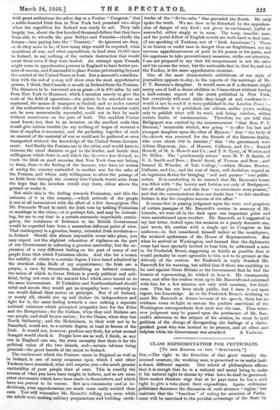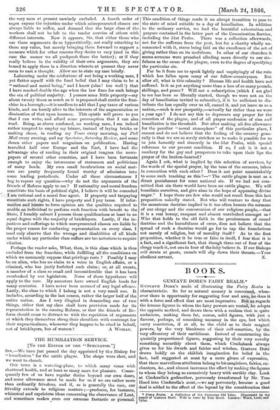CLASS REPRESENTATION FOR PETTICOATS.
[To THE EDITOR OF THE " SPECTATOR."] SIR,—The right to the franchise of that great recently dis- covered creature, the working man, is presented to us under half- a-dozen different aspects. One school of philosophers affirms that it is enough that he is a rational and moral being to make it his natural right to choose by what laws he shall be governed. More modest thinkers urge that as he pays taxes he has a civil right to give a vote about • their expenditure. Again, utilitarian politicians denounce the discussion of such abstract "rights," but maintain that the " function " of voting for members of Parlia- ment will be exercised to the peculiar advantage of the State by
the very men at present unwisely excluded. A fourth order of sages expose the injustice under which misrepresented classes are always liable to suffer, and demand that the large class of the workers shall not be left to the tender mercies of others with different interests. Now it appears, Sir, that either those who use these arguments do so hypocritically, not really attaching to them any value, but merely bringing them forward to support a measure which for other reasons they desire to cary (and in this case the sooner we all poohpooh them the better) ; or if they really believe in the validity of their own arguments, they are bound to apply them in a direction whereto at present they never seem to cast a thought. Allow me to state my case briefly.
Labouring under the misfortune of not being a working man, I yet flatter myself with the fond belief that I may claim to be a " rational and moral being," and I know (alas ! too well !) that I have reached double the age when the law fixes for such beings the era of political majority. I possess some little property—say about twenty times as much as it is proposed shall confer the fran- chise in a borough ;—it is needless to add that I pay taxes of various kinds, and am keenly alive to the interests of the augmentation or diminution of that upon incomes. This epistle will prove to you that I can write, and afford some presumption that I can also read. Being, as above confessed, no working man, I am indeed rather tempted to employ my leisure, instead of laying bricks or making shoes, in reading my Times every morning, my Pall Mall every evening, and my Spectator, Saturday Review, and some dozen other papers and magazines on publication. Having travelled half over Europe and the East, I have had the advantage also of reading in their original tongues the news- papers of several other countries, and I have been fortunate enough to enjoy the intercourse of statesmen and politicians of many lands. My own small lucubrations on social mat- ters are pretty frequently found worthy of admission into some leading periodicals. Under all these circumstances I beg to repeat my question—why do not the arguments of the friends of Reform apply to me ? If rationality and moral freedom constitute the basis of political right, I believe it will be conceded I am rational and a moral free agent. If property and taxpaying eonstitute such rights, I have property and I pay taxes. If infor- mation and leisure to form opinion are the qualities required to enable an individual to perform such function with benefit to the State, I humbly submit I possess those qualifications at least in an equal degree with the majority of bricklayers. Lastly, if the in- justices and sufferings to which unrepresented classes are liable be the proper reason for conferring representation on every class, I need only observe that the wrongs and disabilities of all kinds under which my particular class suffers are too notorious to require citation.
Perhaps the reader asks, What, then, is this class which is thus excluded from the franchise, while fulfilling all the conditions on which we commonly suppose that privilege rests ? Possibly I may be an alien, who has no claim to a voice in English affairs, or a criminal, who has justly forfeited such claim ; or, at all events, a member of a class so small and inconsiderable that it has been overlooked by our legislators. None of these hypotheses will apply to the case. My ancestors have owned English lands for many centuries. I have never been accused of any legal offence. Lastly, the class to which I belong is not a very small one. It includes, according to the last census, rather the larger half of the entire nation. Am I very illogical in demanding one of two things, either that my class shall have provision made for its representation in the coining Reform, or that the friends of Re- form should cease to distract us with the repetition of arguments at which they themselves shrug their shoulders with contempt for their unpracticalness, whenever they happen to be cited in behalf,































 Previous page
Previous page